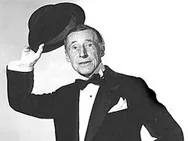Knickerbocker Holiday
Brief Synopsis
Cast & Crew
Harry Joe Brown
Nelson Eddy
Charles Coburn
Constance Dowling
Ernest Cossart
Shelley Winter
Film Details
Technical Specs

Synopsis
In 1647, the citizenry of New Amsterdam eagerly await the arrival of their new governor, Peter Stuyvesant. Meanwhile, Tienhoven, the head of the city council, convenes a meeting to order the arrest of crusading newspaper publisher Brom Broeck, who has accused the council of being scoundrels and thieves. Upon hearing the news, Tina, Tinhoven's daughter and Brom's sweetheart, hurries to the newspaper officer to warn Brom of his impending arrest. There, Tina chides Brom for failing to settle down and marry her. Soon after, Tienhoven and the jailer arrive and usher Brom to the stockades. After they leave, Tina organizes Brom's supporters to demonstrate at the stockades. When Stuyvesant arrives, Tina escorts him to the townsquare, where Brom is confined. Stuyvesant, a shrewd manipulator who regards his silver peg leg as a symbol of power and authority, realizes that Brom is being made into a martyr and orders his release. Stuyvesant then promises to abolish bribery and corruption, thus tricking the population into believing that he is their friend. To silence Brom, Stuyvesant offers him the job of "Secretary of Printing," and Brom naïvely accepts so that he can earn enough money to marry Tina. After confiscating the concilmen's property and businesses, the greedy Stuyvesant placates them with slick words and medals. Enchanted by Tina, Stuyvesant decides to eliminate Brom as his rival and slyly convinces the idealistic young man to leave New Amsterdam and travel to the colonies to promote unity. Agreeing to postpone his marriage for the good of his country, Brom departs on his mission. In his absence, Stuyvesant begins to woo Tina, who regards him as "an old pot roast." By the time Brom finally returns home, Tina is furious with him for leaving her. At the governor's ball, Tienhoven announces his daughter's engagement to Stuyvesant, and Tina, blaming Brom for her predicament, storms out. Later, at the barbershop, Brom threatens Tienhoven with the blade of a razor and insists that he break Tina's engagement. Meanwhile, at the Tienhoven house, Stuyvesant is pressing Tina to agree to an early wedding date. As Tina begs for more time, Brom and Tiehoven burst into the room. After Brom apologizes and kisses Tina, she forgives him, and Stuyvesant sentences him to spend five years in jail for his impertinence. Sneaking into the jail house, Tina jumps through the bars and into Brom's cell, ripping her skirts in the process. When Brom's Indian friends come to his cell window, Brom fashions a rope with Tina's skirts, ties it around his cell bars and asks Big Muscle, an Indian strongman, to yank the bars from the window. Brom then escapes into the woods, and when Tienhoven and Stuyvesant find Tina, the jilted Stuyvesant bribes her father into consenting to an immediate wedding. Meanwhile, Brom and his assistant, Tenpin, launch a campaign against the tyranny of the governor and call for a meeting of the colonists to overthrow the government. When Stuyvesant learns about the planned assembly, he schedules a fair on the day of the meeting and offers a large reward for Brom's arrest. On the day of the fair, Tenpin and Brom, wearing disguises, pass out pamphlets opposing the governor's policies, while Tina sneaks into the mansion and steals Stuyvesant's silver peg leg. Unable to leave the palace without his leg, Stuyvesant devises a plan to lure Brom there by announcing that the wedding is to be held at noon. Brom outsmarts Stuyvesant by diverting the crowd to the stockade, where he calls for a rebellion against the governor's policies. Brom's plan backfires, however, when the crowd erupts into an angry mob. Realizing that only Stuyvesant's slick words can calm the mob, Brom goes to the palace and offers the governor a chance to become an honest man by instituting order and democracy. Brom then returns Stuyvesant's peg leg, now stripped of its silver plating, and Stuyvesant welcomes the colonlists as partners in the union. Brom and Stuyvesant shake hands, inaugurating a new political era.

Director
Harry Joe Brown
Cast

Nelson Eddy

Charles Coburn
Constance Dowling

Ernest Cossart

Shelley Winter
Johnny Davis

Percy Kilbride

Otto Kruger

Fritz Feld
Richard Hale
Carmen Amaya

Chester Conklin
Crew
Maxwell Anderson
David Boehm
Sid Brod
Forman Brown
Harry Joe Brown
Sammy Cahn
Steve Drum
Nelson Eddy
Harold Goldman
Walter Hannemann
Julia Heron
Bernard Herzbrun
Werner R. Heymann
Werner R. Heymann
Rowland Leigh
Thomas Lennon
John F. Link
Stanley Logan
Raoul Pagel
Theodore Paxson
Theodore Paxson
Walter Plunkett
Nina Roberts
Jacques Samossoud
Franz Steininger
Jule Styne
Philip Tannura
Kurt Weill
Ben Winkler

Film Details
Technical Specs

Award Nominations
Best Score
Quotes
Trivia
Notes
The film opens with the following written prologue: "Little Old New York in 1647-when it was ruled by the Dutch and called New Armsterdam for short. Any similiarity between the two towns is purely coincidental and unintentional." According to a pre-production Hollywood Reporter news item, Walter Huston, who appeared in the Broadway production, was originally to appear as "Peter Stuyvesant," and Marta Eggerth was to play the female lead. Although a Hollywood Reporter production chart places Charles Judels, Dick Baldwin, Ferninand Munier and Percival Vivian in the cast, their participation in the released film has not been confirmed. Although Theodore Paxson is credited with additional musical numbers, his exact contribution is not known. This was the initial production of Producers Corporation of America, headed by former agent and publicity man Sid Shlager. On November 17, 1950, NBC broadcast a televised version of the Maxwell Anderson musical, directed by William Brown, Jr. and starring Dennis King, John Raitt and Doretta Morrow.












